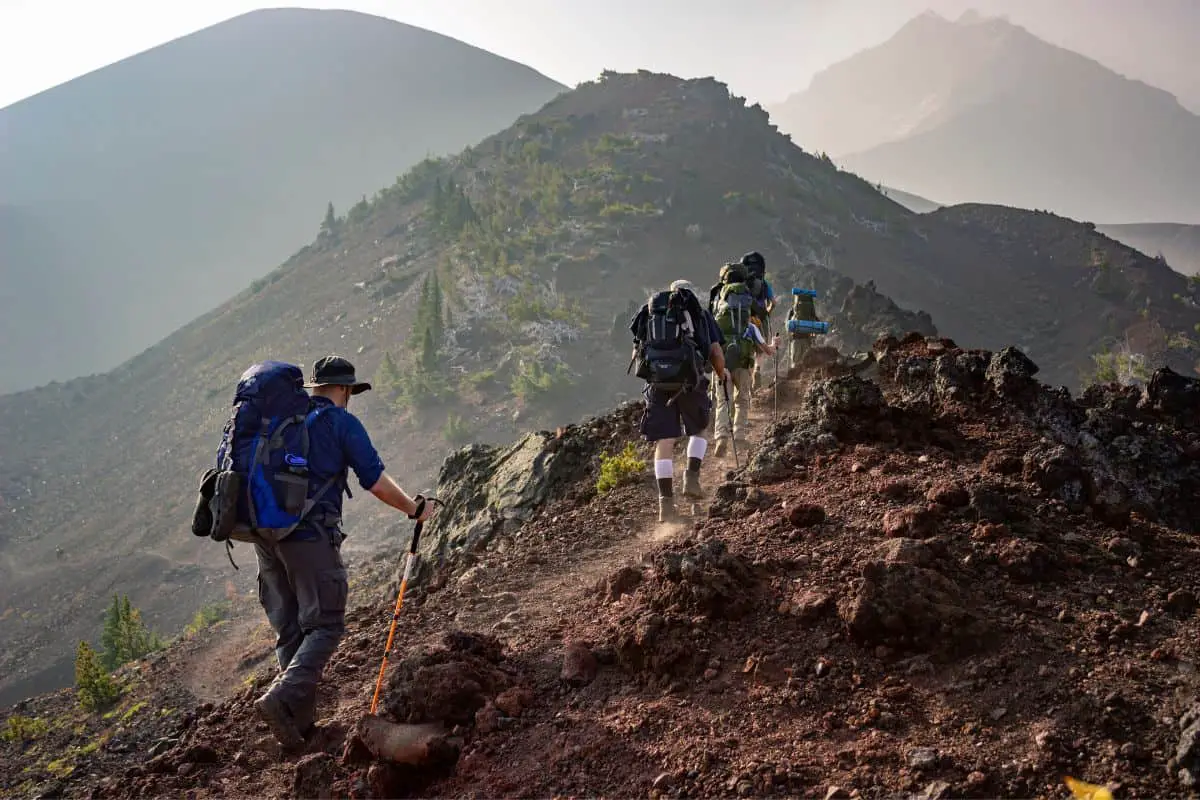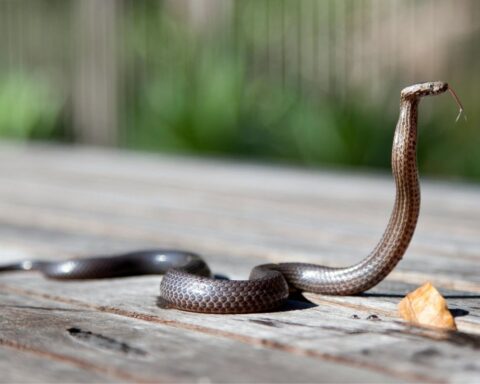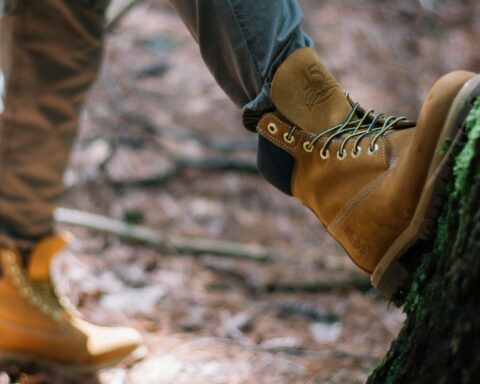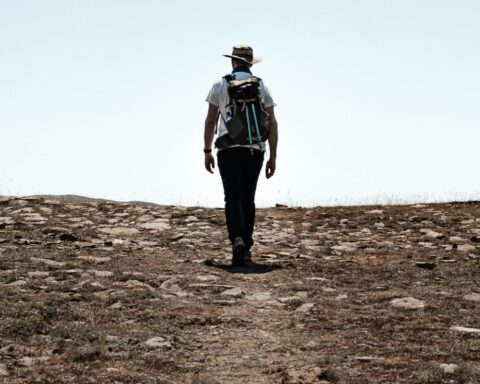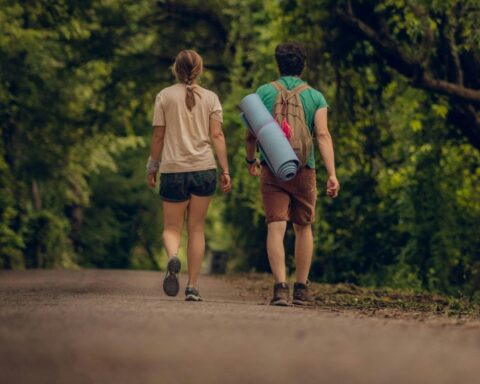As reported by the Center for Disease Control and Prevention, 7,000 to 8,000 people are bitten by poisonous snakes in the U. S. every year.
Especially when you are out hiking in the wilderness, getting bitten by snakes is something that can definitely happen, but something that you can also prevent.
How can you prevent that? Keep reading below to find out!
How To Prevent Snake Bites While Hiking
While snakes are not instinctually hostile toward people, they will attack you if they feel intimidated.
According to the US Forest Service, this happens mostly in cases where an individual starts getting too close to a snake or unintentionally touches it when hiking or climbing.
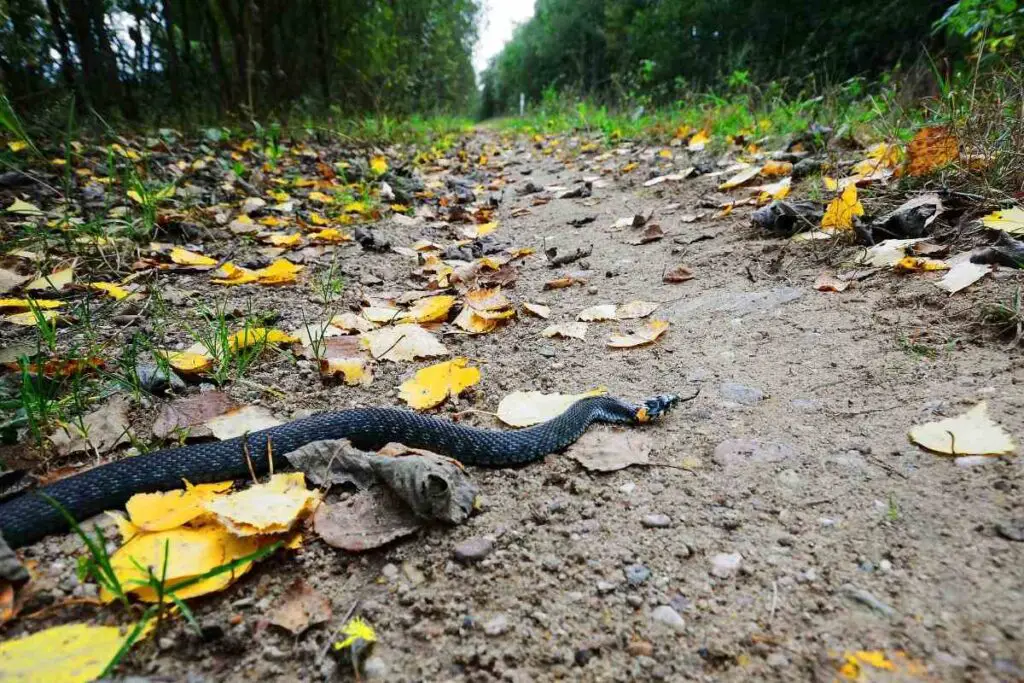
A large percentage of snake bites occur on the hands, legs, and ankles. However, there are a few simple preventative measures you can take to mitigate the likelihood of getting bitten by one.
Don’t Leave Your Trail
The most important thing is to keep moving on the trail. Snakes prefer hiding in high grass and dense bushes, which are less common along a well-traveled trail.
So, make sure to keep your dog on its leash, and never allow children to run wild. That way, you can always stay on the trail.
Read next 🐶 – Best Hiking Dogs
Stay Vigilant
In a similar vein, keep your eyes open. You need to stay alert and be careful even when it’s darker or foggy not to step with your foot in off-trail vegetation or in muddy potholes.
The same is true for sitting or holding on to rocks (for instance, when mountain climbing), as snakes can be hiding underneath or near them.
Check Your Equipment
Snakes can easily hide inside your tent or sneak inside your sleeping bag when you leave your backpack by a rock to take a break.
Another thing we’ve already mentioned is not to grab any rocks before checking first if they are hiding any snakes underneath them.
Don’t Forget – Snakes don’t have ears so they won’t be able to tell you are there unless they see you and uncovering them by picking up a rock might take them by surprise and have them attack you.
Dress Appropriately
Put on long pants and hiking shoes with thick socks to provide extra shielding for your feet and your legs.
When it’s too hot during the summer to dress like that, you should still not wear shoes that have openings, like sandals, as they will expose your skin.
Find out 🐍 Will Snakes Cross a Rope?
React The Right Way
If you come across a snake during your hike, the last thing you should do is confront it or start throwing things at it.
Simply walk away from the animal or move around it to gain some distance. Do not start moving abruptly and sharply when you are in front of the snake and avoid handling it as a snake that’s just been killed can still be venomous.
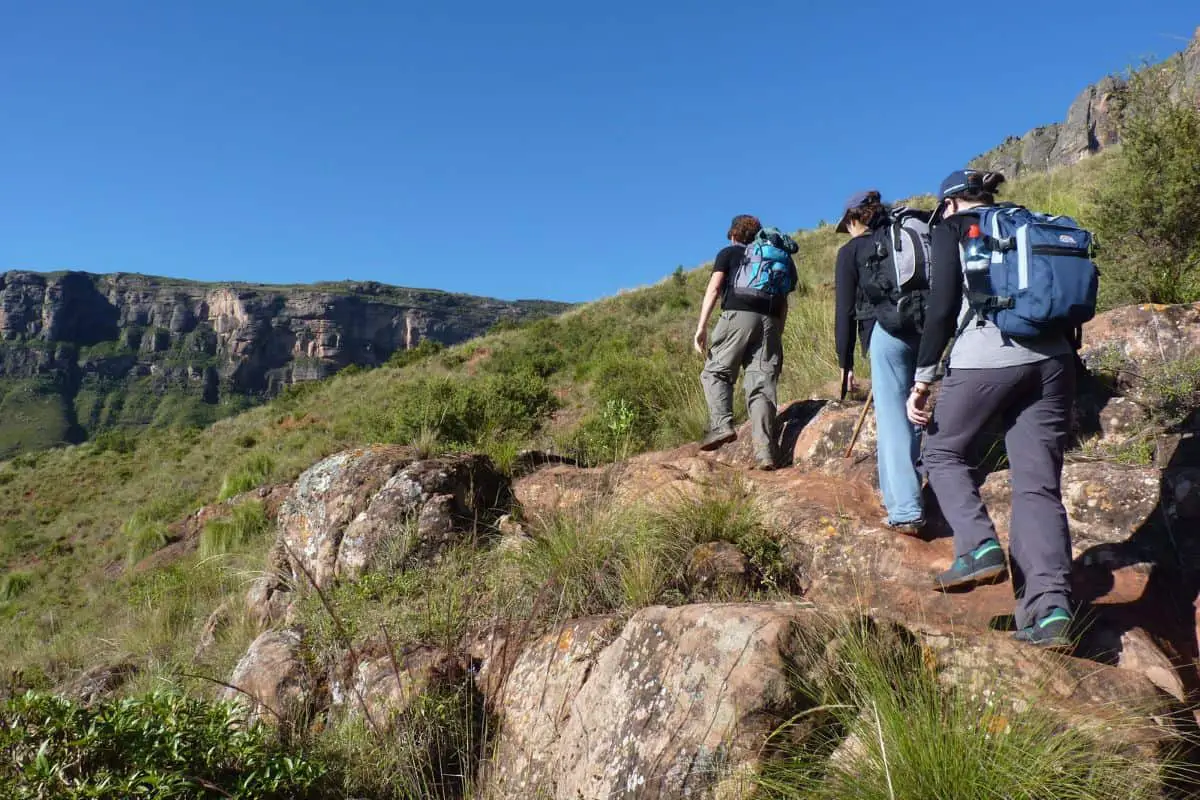
What To Do If You Get Bitten By Poisonous Snake While Hiking
Get The Right Treatment
Quickly dial 911 or the Poison Control Center helpline (800/222-1222) as you will have to be treated with some special drugs as soon as possible.
Meanwhile, you should be prepared for the bite to be painful and anticipate some blood loss from it.
The area where the snake bit you will also start looking swollen and you will probably feel dizzy and nauseous too.
Maintain Your Cool
It’s harder than it sounds, but the truth of the matter is that an accelerated heartbeat will circulate the venom through your body more quickly.
Protect Your Heart
Keeping the bitten spot below your heart will delay the venom’s entrance to that vital organ. Therefore, it is vital that you stand still or keep the bitten spot as further away and closer to the ground as you can.
Avoid Squeezing The Bitten Spot
Take off any restrictive clothes and shoes and do not use a compression bandage.
Cutting off the circulation of blood vessels anywhere around a bite can cause inflammation and might then necessitate amputation.
Don’t Try To Treat It
Sucking the venom out or making surgical or simple cuts where the bite is won’t help. There are many people who believe that these actions can make it all better, but they won’t.
In all likelihood, you will end up injuring yourself, even more, so don’t trust the movies.
Just seek immediate help like we suggested above and use the rest of the tips to stay in the best condition possible while you wait to get treated.
Are Hiking Boots Snake-Proof?
Hiking boots of good quality are made of leather and rubber, which are the finest shoe materials for protection against snake bites.
The majority of snakes have teeth that are too small to pierce through these materials. As such, their bite should be harmless.
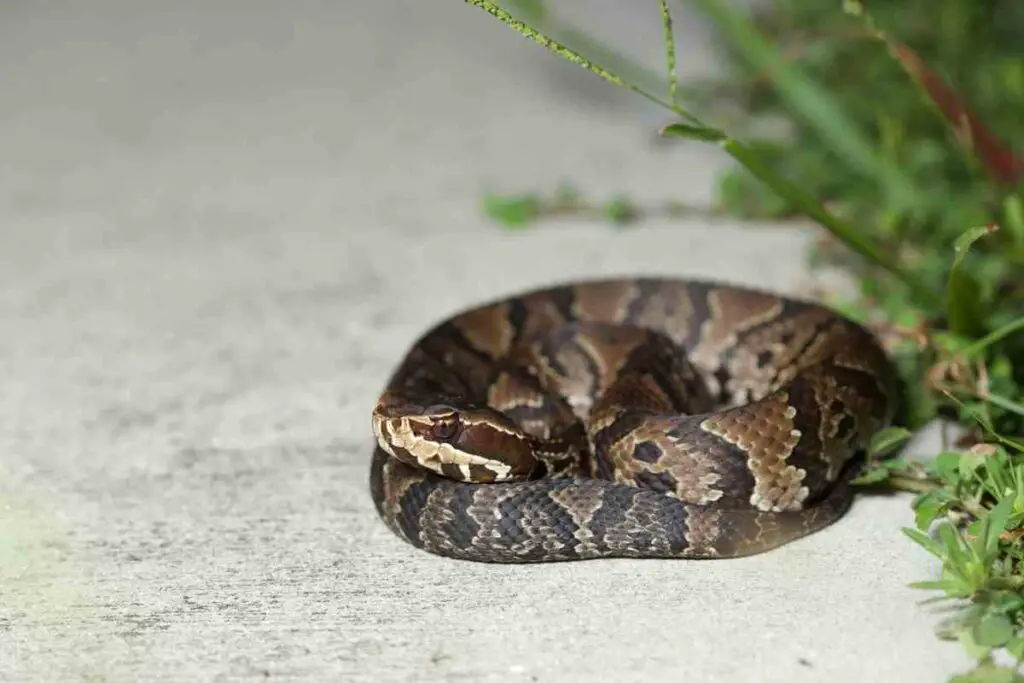
To be effective, your hiking shoes should rise at least two inches over your ankles. So, if you do make the wise choice to put on your hiking boots, make sure they’re built of leather rather than synthetic material.
Synthetic leather isn’t nearly as durable as genuine leather, yet it is preferable to wear your sneakers.
In case you have a pair of rubber boots, keep them neat and dry, particularly when they have been exposed to sunlight for a long time.
Are Snakes Capable Of Striking Over The Knees?
The majority of snakes can bite as high as 1/3 to 1/2 of their total length.
This means that almost all the bites are usually landing close to, in front of, or on the calf area. If not there, snakes will typically bite people in the area between the hips and the knees.
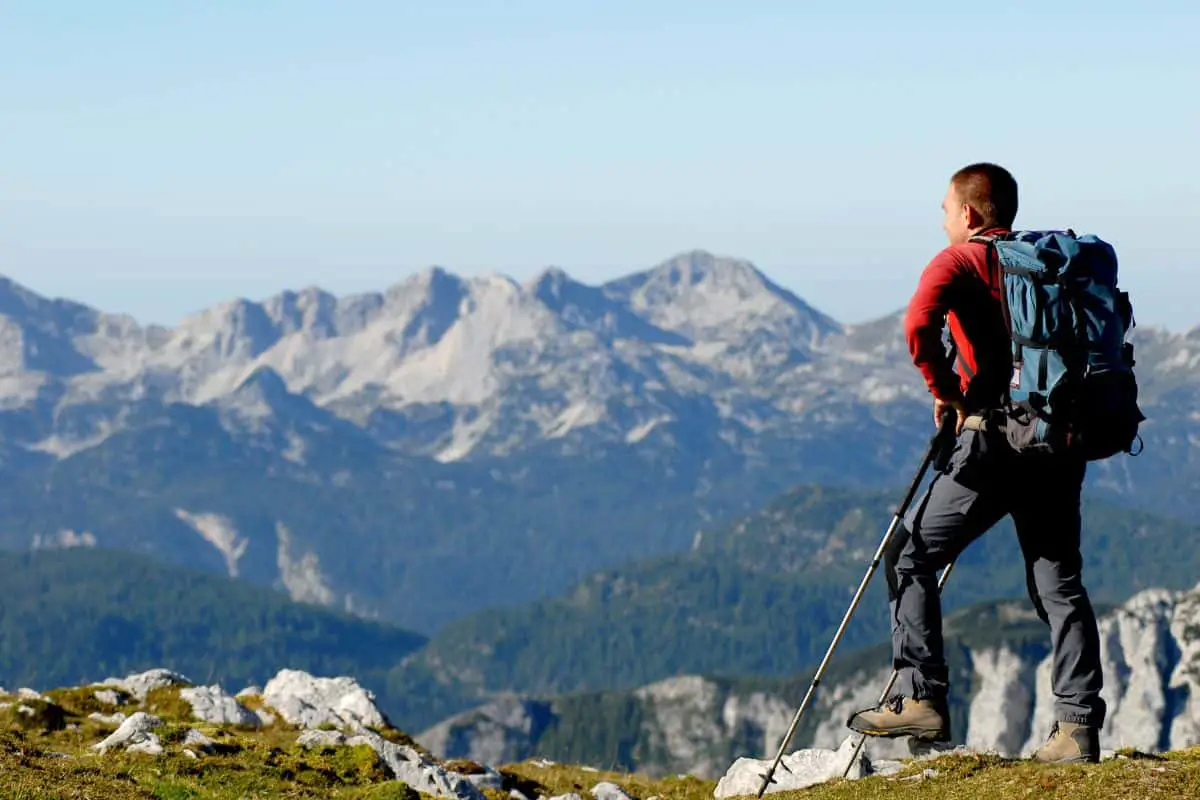
How To Prevent Snake Bites While Camping
Snakes are not only a potential risk during a hike, but one that you might have to deal with when camping for the night during your hiking trip. So, how can you prevent them from biting you?
Here are some tips:
Choose Snake-Free Spots For Camping
If you really don’t want to see any snakes while camping, look for places where there aren’t any.
Although there are essentially only two states within the United States that are free of snakes (Alaska and Hawaii), there are many parks and leisure zones in all states that do not have deadly snakes.
Northern areas and states are preferable, so if you are truly scared of the presence of snakes, it’s best to head north.
Do Not Choose Campsites In Woodland Or Bouldery Areas
In scenarios in which you cannot avoid seeing snakes, you can reduce your chances of encountering one by selecting a reliable campground.
Snakes, for example, are drawn to hanging out in bouldery or wooded landscapes filled with rocks, sticks and leaves that they can use as cover.
So, choosing not to camp in such places can minimize the chances of seeing snakes.
Keep Your Food Stored
Theoretically, snakes are really not particularly drawn to our flavorful food, so you don’t have to keep your food away from snakes in the same way you’d keep it away in territories where bears are known to live.
However, the mice snakes eat will be drawn to your food, bringing their predators along sometimes. Therefore, store your food in your tent or in places that rodents and insects cannot smell it.
Be Tidy
Another thing you should do is be tidy and make sure that the area you have set your tent in is clean.
Scattering cans, bottles and bags around your two-person tent means you are essentially providing snakes and mice with hiding spots.
As a result, if you want to avoid ‘inviting’ these little friends into your campsite, you need to keep your place tidy and clear from items where they can hide.
Check Your Tent Before You Step Inside It
No matter how careful you are, snakes can sneak inside your tent from the smallest of holes.
So, to make sure that you are alone in that tent and have a good night’s sleep, do a thorough check under the mattress, sleeping bag and bags.
If you have your clothes and shoes scattered around, you will also have to check them one by one.
It might sound like too much of an effort after a long day, but it’d be a pity for you to have to stop your adventurous trip just because you got bitten by a snake!
The Bottom Line
Snakes are not inherently dangerous for people, but they will and do attack us when we are not careful.
A snake bite can be lethal, so if you ever get bitten make sure to seek treatment right away and don’t underestimate the severity of it, even if the snake is not known to be venomous.
So, whether you are camping or hiking, stay alert and keep safe from snakes!
